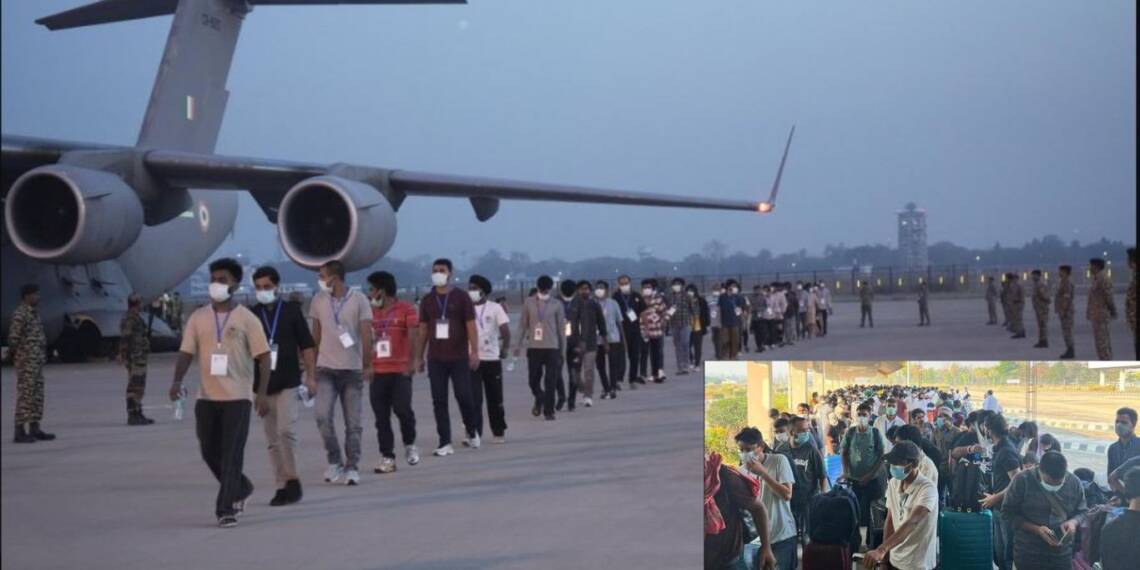The Indian government has successfully brought back 549 of its citizens who were trapped in cybercrime centers along the Myanmar-Thailand border. These individuals had been lured with fake job offers in the IT sector but were instead trafficked into scam operations run by Chinese criminal gangs. This rescue operation shows the growing threat of organized cyber fraud in Southeast Asia and the risks faced by job seekers looking for overseas opportunities.
How Did Indians Get Trapped?
Many of the rescued Indians came from states such as Andhra Pradesh, Telangana, Maharashtra, Gujarat, Punjab, and Uttar Pradesh. They were promised well-paying IT jobs in Thailand and Myanmar. Upon arrival, they were trafficked into remote areas controlled by criminal groups, where they were forced to work in online farud. These areas are beyond the reach of local governments. It makes them safe havens for illegal activities.
Once trapped, these individuals had to engage in cyber fraud, targeting victims mainly in the United States and other developed nations. They were subjected to harsh working conditions, forced to scam innocent people, and not allowed to leave. This form of cyber slavery has become a major concern in Southeast Asia.
The Crackdown and Rescue Operation
The rescue of these Indians was part of a larger crackdown involving the governments of Thailand, Myanmar, and China. More than 7,000 people from various Asian and African countries were freed from locked compounds where they were forced to conduct online scams. After their release, the Indian nationals were taken from Myanmar’s Myawaddy region to Mae Sot in Thailand. They were housed in detention centers before being flown back to India on Indian Air Force (IAF) aircraft.
On Monday and Tuesday, two flights operated by the IAF brought back the rescued individuals. The Indian embassies in Myanmar and Thailand played a crucial role in coordinating their safe return. External Affairs Ministry spokesperson Randhir Jaiswal confirmed that India has been making sustained efforts to bring back its citizens trapped in such fraudulent operations.
The Rising Threat of Cybercrime Syndicates
This incident is not an isolated case. Over the past few years, hundreds of Indians have fallen victim to similar scams in Cambodia, Laos, Myanmar, and Thailand. Criminal gangs lure job seekers with attractive offers, only to trap them in scam centers where they are forced to commit online fraud.
One of the most notorious scams run by these criminal syndicates is called the “pig butchering” scam. This method involves fraudsters building trust with victims over time before convincing them to invest money in fake online platforms. The term comes from the practice of fattening a pig before slaughtering it, symbolizing how scammers gradually gain the trust of their victims before financially exploiting them.
The Scale of the Problem
According to reports, India’s immigration authorities noted that out of 73,138 Indians who visited certain Southeast Asian countries on visitor visas between January 2022 and May 2024, about 30,000 have not returned. This raises concerns that many may have been trapped in illegal activities similar to those exposed in Myanmar and Thailand.
In January 2024, the Indian embassy in Laos rescued 67 Indian men who had been trafficked into cyber scam centers. So far, India has rescued 924 of its citizens from such fraud rings in Laos alone.
Government Warnings and Precautions
The Indian government has repeatedly warned citizens against falling for fake job offers in Southeast Asia. The Ministry of External Affairs has advised job seekers to verify foreign employers through Indian embassies and check the legitimacy of recruitment agents before accepting overseas jobs.
The government has also been using social media and official advisories to raise awareness about these scams. It has urged Indian citizens to be cautious and conduct thorough research before taking up job offers abroad.
Conclusion
Rescuing 549 Indians from the cybercrime centers is a resounding success of India’s security and diplomatic actions. But at the same time, this also acts as a wake-up call for job hunters and authorities as well. Because cybercrime gangs are still at work in ungoverned territories of Southeast Asia, the threats of trafficking and forced labor will always be lurking.
To avoid such occurrences, the government should keep raising awareness, toughen regulations on foreign job placements, and increase diplomatic engagements with the affected nations. At the same time, individuals must remain vigilant and verify job offers before making decisions that could put them in danger.
Cybercrime is a growing global issue, and as criminals adapt to new technologies, governments and individuals must work together to counter these threats and protect vulnerable populations from exploitation.








